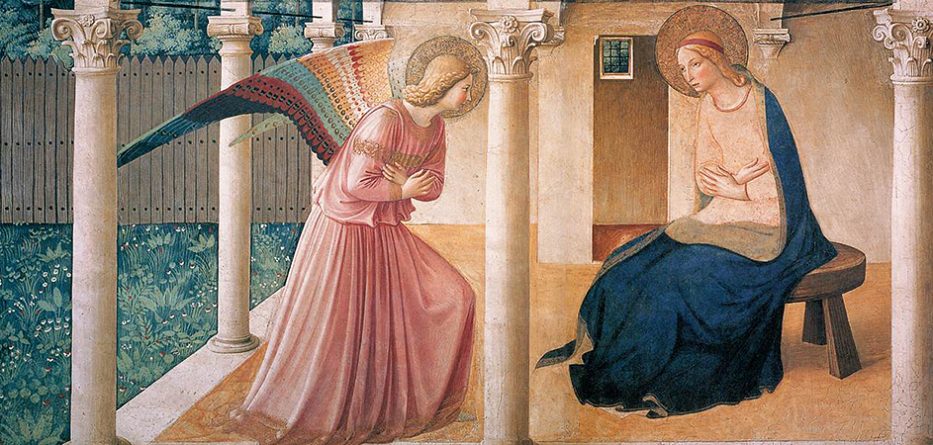‘The Annunciation’
The First Joyful Mystery
The Word is made flesh. The flesh is the Mother’s.
The Mother is willing.
—Sebastian Moore
It is sad to see people in full flight denouncing others, especially when it is done publicly. Usually they are unhappy people, oblivious to their own character flaws and with absolutely no sense of humour about themselves.
If people can only ever denounce or condemn others, what is really going on? How can we instead develop a more balanced ‘climate’, where we can also communicate the abundant good news and love all around us?
Of course, denunciation of evil and injustice has its place in all authentic prophetic criticism.
But philosophers identify a type of ideological thinking— the ‘hermeneutic of suspicion’—omnipresent in our media-driven culture. It is an approach which has devastating effects in our culture and even within the Church.
Pope Francis brilliantly analyses this precise challenge in Evangelii Gaudium when he writes of ‘one [who] analyses and classifies others, and … exhausts his or her energies in inspecting and verifying’ (94).
Such lack of trust locks people into a tiny merciless world, dominated by suspicion and doubt.
Only the gift of faith and trust can diminish such deep suspicion. Mary, the first disciple and mother of Jesus of Nazareth, shows us another way forward.
True prophecy is not just denunciation, but ‘annunciation’: that is, the proclamation of the Good News.
This is what is at the very heart of Mary’s mystery of the Annunciation. Such ‘Good News’ may not sell papers but it is the core of our faith in what is ‘really real’.
Consider what is at stake in the Annunciation narrative. It is all about a vulnerability which opens up to the possibility of love. Mary, a single, vulnerable unmarried mother, is not paralysed by the thought of other people’s reactions. She does not resist or label the incredible challenge put to her as ‘bad news’ for her. Mary actively accepts. Others might well have reacted rather differently to the angel Gabriel’s message.
Mary puts her trust in the presence of God in her life. Mary’s encounter with the angel Gabriel actually strengthens her. For the Annunciation story is all about divine love as the source of empowerment. Such openness also allows Mary to trust Joseph. Joseph prevents her vulnerability from becoming exposure. His selfless love enfleshes God’s love as he protects her. For authentic love is the good presence of someone in vulnerability.
The Annunciation story then is about a self-possessed, self-focussed and self-conscious poor young woman who finds favour with God and is willing to cooperate with a wild plan of salvation. It is about a woman strong enough to risk believing something incredible about herself: ‘the Lord is with you’.
That beats all the ‘bad news’ the doomsayers and denouncers can rouse up.
Alleluia!
The Annunciation – Denise Levertov
We know the scene: the room, variously furnished,
almost always a lectern, a book; always
the tall lily.
Arrived on solemn grandeur of great wings,
the angelic ambassador, standing or hovering,
whom she acknowledges, a guest.
But we are told of meek obedience. No one mentions
courage
The engendering Spirit
did not enter her without consent. God waited.
She was free
to accept or refuse, choice
integral to humanness.
Aren’t there annunciations
of one sort or another in most lives?
Some unwillingly undertake great destinies,
enact them in sullen pride,
uncomprehending.
More often those moments
when roads of light and storm
open from darkness in a man or woman,
are turned away from
in dread, in a wave of weakness, in despair
and with relief.
Ordinary lives continue.
God does not smite them.
But the gates close, the pathway vanishes.
She had been a child who played, ate, spelt
like any other child—but unlike others,
wept only for pity, laughed
in joy not triumph.
Compassion and intelligence
fused in her, indivisible.
Called to a destiny more momentous
than any in all of Time,
she did not quail,
only asked
a simple, ‘How can this be?’
and gravely, courteously,
took to heart the angel’s reply,
perceiving instantly
the astounding ministry she was offered:
to bear in her womb
Infinite weight and lightness; to carry
in hidden, finite inwardness,
nine months of Eternity; to contain
in slender vase of being,
the sum of power—
in narrow flesh,
the sum of light.
Then bring to birth,
push out into air, a Man-child
needing, like any other,
milk and love—
but who was God.
Think about it:
- How has the ‘gift of faith and trust’ been Good News in your life? Is this gift ‘annunciated’ or evident to others? If so, how? If not, why?
- Identify the times you have struggled to wait in your personal vulnerability to allow God’s loving presence to enter. Recall how you felt at the time. Consider what you might do next time to ‘let God in’.
- ‘The engendering spirit did not enter her without consent. God waited. She was free to accept or refuse, choice integral to humanness.’ Reflect on the important choices in your life. What do you most value/admire about Mary as a model of faith? Why?
Br Mark O’Connor FMS is the Vicar for Communications in the Diocese of Parramatta.








